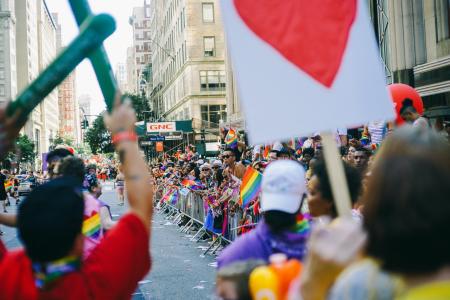As LGBTQ+ rights continue to evolve globally, Germany remains a leader in fighting for equality. Here's a run-down of the history, rights, and culture of Germany's LGBTQ+ community.

Germany is a country with a rich history of LGBTQ+ rights and culture. From the early days of the Weimar Republic to today, Germany has been at the forefront of protecting and promoting the rights of LGBTQ+ people.
As LGBTQ+ rights continue to evolve globally, Germany remains a leader in fighting for equality. Here's a run-down of the history, rights, and culture of Germany's LGBTQ+ community.
Germany has a long and proud history of LGBTQ+ rights and culture. In the early days of the Weimar Republic, Germany was one of the first countries to recognize same-sex relationships.
The German Constitution of 1919 included Article 175, which outlawed homosexual behavior between men. However, this law was not actively enforced, and many Germans openly defied it.
After World War II, Germany experienced a "sexual revolution" in which many taboos surrounding sex and sexuality were broken down. In 1969, the German Parliament decriminalized homosexual relations between consenting adults. This law paved the way for greater acceptance of LGBTQ+ people in German society.
Germany has continued to be a leader in LGBTQ+ rights in the years since. In 2017, Germany recognized same-sex partnerships with full legal equality to heterosexual marriages. Germany also passed a law allowing transgender people to change their gender without undergoing surgery legally.
In 2019, Germany's Parliament voted to ban the so-called "conversion therapy" (a pseudo-scientific practice that claims to be able to "cure" queer people) for minors and is partially forbidden for adults.
Today, Germany is home to a vibrant and thriving LGBTQ+ community. There are numerous pride events held throughout the country each year, including the world-famous Christopher Street Day parade in Berlin. Germany also has several LGBTQ+ friendly bars, clubs, and other nightlife venues.
In Germany, many terms are used to describe LGBTQ+ people and their relationships.
Here are some of the most common terms:
Let us take a look at LGBTQ+ rights in Germany.
While there is still some work to be done in terms of complete equality, Germany is one of the most LGBTQ+ friendly countries globally.
In Germany, LGBTQ+ people enjoy full legal equality. Same-sex marriage has been legal since 2017, and transgender people can legally change their gender without undergoing surgery.
Due to full legal equality, same-sex couples are entitled to the same tax breaks and social security benefits as heterosexual couples. In addition, married same-sex couples can jointly adopt children and are entitled to the same parental rights as heterosexual couples.

These are a few aspects of LGBTQ+ policies:
Despite the progress that has been made, some challenges remain. For example, violence and discrimination against LGBTQ+ people are still a problem in some parts of Germany. In addition, many LGBTQ+ people do not feel comfortable coming out publicly due to fear of discrimination.
Christopher Street Day (CSD) is an annual pride parade held in Berlin, and other major cities across Germany, celebrating gay, lesbian, bisexual, transgender, and queer (LGBTQIA+) culture and pride. The event commemorates the Stonewall riots of 1969, a turning point in fighting for LGBTQ+ rights.
CSD Berlin is one of the largest pride parades globally, with over half a million people attending each year. The parade features floats and marchers from various LGBTQIA+ organizations, and the event is typically accompanied by a wide range of people, from queer people to their allies.
In addition to the main parade, CSD Berlin also features several other events, including concerts, film screenings, and parties. The event is open to everyone, and it is a great way to celebrate diversity and show support for the LGBTQIA+ community.
The LGBTQIA+ community in Germany will be celebrating several special events this year.
The following is a list of all the upcoming dates for each event.
LGBTQIA+ rights in Germany have come a long way since the country's decriminalization of homosexuality in 1871. Today, the country is home to a large and vibrant LGBTQ+ community and offers many legal protections and benefits to queer people.
Want to know more about LGBTQ+ friendly universities and communities in Germany?
LGBTQ+ in Germany
Germany is one of the most popular destinations for Americans looking to relocate to Europe. Whether you’re moving for work, education, or simply for...

Driving on the right side of the road & tips on how to drive safely in the country. We all know that there is the Autobahn in Germany and that there...

Important things to know when buying groceries in Germany If you're new to Germany, you'll soon discover that most local grocery stores have an...

Have you ever wondered how to get a German driver's license at a certified driving school?

Germany enjoys a number of national and regional public holidays and other festivities that take place throughout the year. Those moving to Germany...

Fundamental to learning any language is becoming familiar with how to talk about days, weeks, months, and years. Mastering how to communicate about...

Despite stereotypes of clipped speech and clinical precision, German is an expressive, clever, and often very amusing language. Its dictionary is...

Germany is home to over 80 million people – as well as a diverse array of religions, customs, and traditions that make up the rich national psyche....